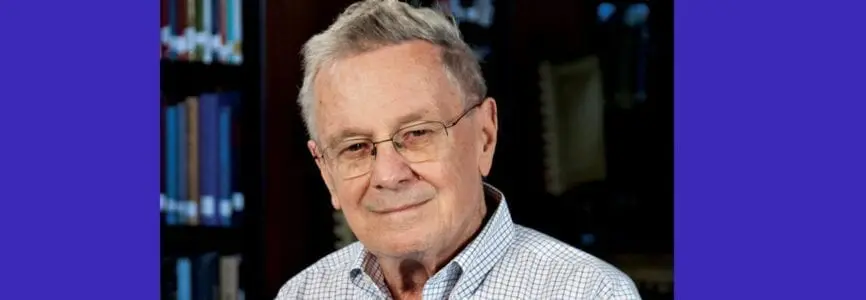Bioethics Forum Essay
Dan Callahan’s Final Interview
On June 25, three weeks before his death, I had the privilege of interviewing Daniel Callahan, or, Dan, as he insisted that I call him.
My first exposure to the field of bioethics was seven years ago when I read The Immortal Life of Henrietta Lacks by Rebecca Skloot. Since then, bioethics has continued to be one of my main interests and a big part of my life. Last year, as a freshman at the University of Michigan, I explored my interest in bioethics more deeply by taking a seminar called Histories of Human Experimentation and joining the Bioethics Society.
For the summer, I jumped at the chance to join the real world of bioethics as an undergraduate intern in the NYU Division of Medical Ethics. In this position, I am working on a project about the role of interdisciplinary discourse in establishing and legitimizing bioethics as a field, so when my mentor, Barron Lerner, recommended that I interview one of the founding fathers of bioethics, I was ecstatic. I would have the opportunity to discuss the evolution of bioethics with someone who was involved in its birth and shaped it into the field it is today. However, the significance of my discussion with Dan was far greater than my project.
When I emailed Dan to ask about meeting with him, he responded almost immediately with questions about the research I had done so far. He sent me some additional reading material to help broaden my perspective. After reading his autobiography, several of his papers, and the articles he sent, I boarded a Metro-North train to Hastings-on-Hudson, N.Y., just north of New York City.
When I arrived at their home, Dan and his wife, Sidney, ensured that I felt comfortable and welcome. The most memorable part of the interview was not Dan’s immense knowledge of bioethics; it was his clear passion for every facet of the field. Before discussing my project, he asked me about my involvement and interest in bioethics. As a newcomer to the world of bioethics, I was surprised that a pioneer of the field wanted to hear about me. However, as I began to tell Dan about the ethical dilemmas that fascinate me, his enthusiasm made it clear that he wanted to know what made me share his love of bioethics.
Dan took the time to thoughtfully answer every question I asked, and I asked a lot of questions. Throughout our discussion, he referenced his experiences from every era of bioethics and applied them to my questions. The best parts of the discussion were his responses to my questions about the evolution of bioethics. When I asked him about what stimulates changes in bioethics, Dan said, “Medicine keeps getting better and better at curing diseases and keeping people alive longer, but it also generates ethical dilemmas which were not around earlier.” He also mentioned the recent focus on global warming and other environmental issues, and said how important it was to recognize climate change and related issues as an integral part of bioethics. Although he didn’t bring it up in our discussion, I since learned that he had recently organized a meeting about how bioethics can help mitigate climate change. When discussing climate change and other modern bioethics issues, he did talk about his book The Five Horsemen of the Modern World, which explored five dangerous global trends – climate change, food and water shortages, the rise of chronic diseases, and obesity — that pose significant ethical challenges. “We will never solve all of the issues in bioethics,” he said, and he smiled because he thought that is how the field should be.
I consider myself incredibly lucky to have met Dan and I am sad that I did not have more opportunities to learn from him. During our conversation, he was full of enthusiasm. He was eager to think about new questions and to learn continuously. He also did not hesitate to laugh or tell jokes. From this one conversation, I could tell that bioethics was far more than a job to him. It was clear that Dan had truly devoted his life to bioethics. His memoir, which I read prior to our meeting, is appropriately titled In Search of the Good because, even in our one encounter, I could tell that he lived his life exactly that way.
Samantha Ratner is a sophomore at the University of Michigan and a summer intern in the NYU Division of Medical Ethics.













